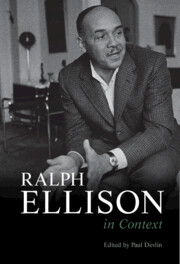Book contents
- Ralph Ellison in Context
- Ralph Ellison in Context
- Copyright page
- Contents
- Figures
- Notes on Contributors
- Abbreviations
- Introduction
- Part I Geographical, Institutional, and Interpersonal Contexts
- Part II Historical, Political, and Cultural Contexts
- Chapter 10 Visualizing Black Identity in Ellison’s Fiction
- Chapter 11 Alternating Currents: Electricity, Humanism, and Resistance
- Chapter 12 Sounds and Signs of Black Womanhood
- Chapter 13 Masculinity
- Chapter 14 Aesthetics of Democracy
- Chapter 15 Black Power and Black Arts
- Chapter 16 Wrestling with the Far Right: Ellison’s Representations of Fascism
- Chapter 17 Southwestern Swing
- Chapter 18 The Self-Fashioned American Blues Identity
- Chapter 19 Ellison’s Durational View of Bebop
- Part III Literary and Critical Contexts
- Part IV Reception and Reputation
- Index
Chapter 14 - Aesthetics of Democracy
from Part II - Historical, Political, and Cultural Contexts
Published online by Cambridge University Press: 14 January 2022
- Ralph Ellison in Context
- Ralph Ellison in Context
- Copyright page
- Contents
- Figures
- Notes on Contributors
- Abbreviations
- Introduction
- Part I Geographical, Institutional, and Interpersonal Contexts
- Part II Historical, Political, and Cultural Contexts
- Chapter 10 Visualizing Black Identity in Ellison’s Fiction
- Chapter 11 Alternating Currents: Electricity, Humanism, and Resistance
- Chapter 12 Sounds and Signs of Black Womanhood
- Chapter 13 Masculinity
- Chapter 14 Aesthetics of Democracy
- Chapter 15 Black Power and Black Arts
- Chapter 16 Wrestling with the Far Right: Ellison’s Representations of Fascism
- Chapter 17 Southwestern Swing
- Chapter 18 The Self-Fashioned American Blues Identity
- Chapter 19 Ellison’s Durational View of Bebop
- Part III Literary and Critical Contexts
- Part IV Reception and Reputation
- Index
Summary
This chapter examines the period between the publication of Invisible Man and the early 1970s (roughly the period defined by the Civil Rights movement) when Ralph Ellison crafted his strategy for how he would define and occupy the public role he found himself and his work suddenly placed. While Ellison is sometimes seen as being politically distant, particularly relative to the Civil Rights movement, the chapter argues that the counter-narrative that Ellison constructed and maintained was that it was his art itself that defined a political stance rather than the other way around. For Ellison, politics discouraged the production of true art rather than stimulated it. During the Civil Rights years, Ellison employed this thinking to move away from focusing on the unique historical experiences of African Americans to a broader emphasis on cultural hybridity.
- Type
- Chapter
- Information
- Ralph Ellison in Context , pp. 157 - 166Publisher: Cambridge University PressPrint publication year: 2021

